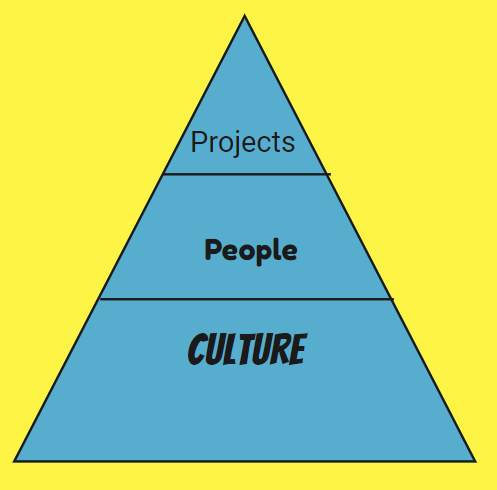Google is an epic company to be hired in, due to its engineering-driven culture and high-freedom policy. But you can build your team around its principles although it requires effort, commitment, and time. It’s the culture that should underpin everything. To build a culture, founders have an important role. But this is not necessarily when the company is first started. You can become a founder and create a culture within your team, even if you’re not the first employee.

There are 10 steps to switch your environment.
- Give your work meaning.
Work is a huge part of everyday life so it’s better if it means more than just a paycheck. As a manager, you should help your people understand the value that their work adds to other parts, and they should make it fun for themselves, so their productivity shows itself as well.
- Trust your people.
“If you believe human beings are fundamentally good, act like it.” but it’s better to start with small gestures to feel more meaningful. Regularly ask your employees about the changes they would make if it was their own business. And you want them to act like that, by giving up some authority. it is better to tell them that every change is a test for some months, and if it works then you’ll keep doing it. But if not, there won’t be any punishment. And if you are part of a team ask your manager to give you some space to grow into it. Every small step can shape the characteristics of ownership.
- Hire only people who are better than you.
If you hire someone not qualified perfectly then he will definitely slow down the team as they have to work more. Hire by the committee and define standards beforehand, and check your new hires’ performance periodically. 90 percent of your new hires should be better than you. “If they’re not, stop hiring until you find better people. You’ll move more slowly in the short term, but you’ll have a much stronger team in the end.”
- Don’t confuse development with managing performance.
Try to have developmental conversations, productively all the time, but try to use the words that won’t make anyone defensive. It happens more safely when it’s on the way to achieving a goal. When a performance period has ended, discuss the outcomes and not the process, the goals that were missed, met, or exceeded, and what would be the rewards or encouragements for each of them. Don’t rely only on the manager to report on how people are doing. Ask everyone in the team to report orally or maybe in form of a short questionnaire. “For performance evaluation, require managers to sit together and calibrate their assessments as a group to guarantee fairness.”
- Focus on the two tails.
Try to get to know your best people better, and try to understand their best specialties specifically. “Don’t find your best salesperson’ find the person who sells best to new accounts of a certain size.” When you find them it will be easier to study them and their reason for being more successful. Then you can use them as teachers. Try to learn how they can be that good by bombarding them with questions at different times. Also, don’t forget about the worst performers. If you hire the right person but for a wrong position or role, you should either help them learn or find a new role. But if neither worked they should leave without any hesitation, cause no one is happy when they are the worst player in the place.
- Be frugal and generous.
There are things that do not cost but have an effect on everyone in the company, like weekly all-hands meetings or negotiating with a catering service or the local fast food restaurant for lunch discounts, giving them advice or mentorship. And it’s better to save your generosity for everyone’s important personal moments like the birth of a new child or medical emergencies. This way “everyone will draw comfort from knowing that should they encounter one of life’s lowest or highest moments, they’ll have the strength of a larger institution behind them,” even if that institution is small.
- Pay unfairly.
“90 percent or more of the value on your teams come from the top 10 percent.” so that 10 percent is much better than the average members. They should feel that they are the alpha of the team, by providing differences, even if not financially. But also for the beta guys you should “explain to them why their pay is different and what they can do to change it.” don’t forget to be generous. Celebrate achievements, and also cheer on failures that provide the teams with lessons.
- Nudge
Not always talking or mentoring helps people to change, small interventions, a.k.a. Nudges can help these moments, to make them happier, more productive, and more inclusive. Just be thoughtful in what to send to who, how will send it and it should be at the right time. Share data about right and positive things like the number of people doing sports and encourage others to get involved.
- Manage the rising expectations.
Before starting any changes, using the ideas from this book or any other books, tell people that you are experimenting with those ideas, so they will support, help, and trust your decision even if things go wrong.
- Enjoy! And then go back to step 1 and start again.
Whether you’re a junior employee or the number 2 thousand employee, “you can still be a founder by choosing how you interact with those around you, how you design your workspace, and how you lead.” This way you can attract the right people.
But don’t forget that every culture and environment needs constant learning and redesign. Try with as many ideas as you try, modify it, and try again. “All of these efforts support one another, and together create an organization that is creative, fun, hardworking, and highly productive.”
Underlying principles of a good HR
- Strive for nirvana.
If you want to work on something specific in the future, “you have to earn the confidence of the organization.” Mass customization is another step, where you should customize everything for the employees individually and at the same time with features that can be used by everyone. The HR team should check regularly the principles of each rule to see if they are relevant to every case, if not that practice should be abandoned.
- Use data to predict and shape the future.
Gather data from everyone in the company, even the owner. To identify what the organization really looks like first, you should “agree on a common set of definitions for all people data” with your HR team. The common definitions make it easier to analyze the data to find the differences.
Hire a fresh grad from psychology, sociology, or related fields or a finance or operations person and try to convince them and the company that your idea makes a difference. Also, you should make people from different sectors join as an HR team. Each of them will teach others about different aspects in different sectors as well as helping others to develop skills.
If anyone came up with ideas, even the craziest ones, be open and try to test them on one team or the whole company, but give an announcement that it’s only a one-month-test, and after that, it will be decided whether to let the action become permanent or not. In this one month, the HR team should examine feedback and people’s reactions.
- Improve relentlessly
Hiring is better than outsourcing because it can be cheaper and also various useful information can be gained by managing processes. (Don’t forget to check out our About and Services.)
“Running your HR department or team with the same standards of clear objectives, continuous improvement, and reliability that are used in the rest of your company will make your organization credible and trusted.”
- Field an unconventional team.
Professionalism and skills don’t always mean the right talent. someone good at programming shouldn’t always be placed in a regular team, maybe he would rather be in the HR department, and just because of certain reasons he was afraid of working in the HR team.
Be aware of the two tails of your own work as well. Evaluate your skills and “identify where you are strong and where you can build.” then you can decide who to hire next.”

All in all, trust your people and try to help with the culture of your organization in the right way so everyone would be happy, satisfied and enjoy living in this company so they help out developing the company or their teams into a legendary place, where anything could be possible. You can start feeding your ideas about a new culture to others little by little. “Live your beliefs through your work.”
Bibliography:
Download for Work Rules!
You can also get additional interesting information about this content. With our newsletter, you will get an efficient set of tools to learn a lot about topics focused on services & digital product building. Read more.









